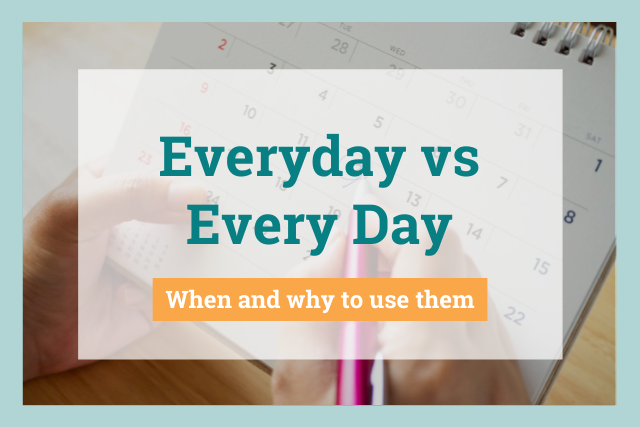
Every day I’m shufflin’.
Not only are these classic song lyrics to LMFAO’s “Party Rock Anthem”—they’re also a great way to start this article. The question is, should it be “every day” or “everyday”?
As is so often the case in the English language, it depends. Here, for instance, “every day” as two separate words is the correct usage (kudos to LMFAO).
But in what cases would the proper usage be “everyday”? And how is one to know the difference? Let’s dig deeper.
Everyday vs Every Day: What’s the Difference?
Here’s the key distinction: “everyday” is an adjective, while “every day” is an adverbial phrase.
As you probably already know, adjectives describe nouns. Adverbial phrases are sets of multiple words that function as adverbs, which describe verbs.
So, in our first example, “every day” is correct, since it’s describing the verb shufflin’ (and we could all do a little more shufflin’, couldn’t we?). “Everyday” wouldn’t make sense here, because there’s no valid noun for it to describe.
To give another example, let’s stick with the music theme and consider Sly and the Family Stone’s hit song “Everyday People.” That one’s also correct as written, because “everyday” is an adjective describing the noun people. There’s not even a verb in there to distract us!
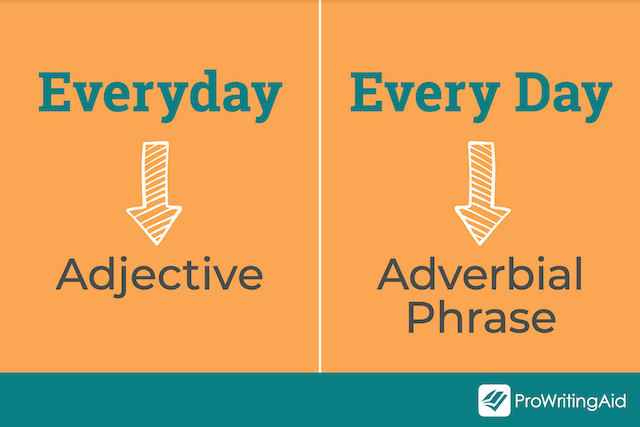
How to Use Everyday and Every Day Correctly
In the above examples, we mostly applied logic. But one might employ other methods to get this right.
Start by analyzing your sentence and determining what function “everyday” or “every day” serves. Is it an adjective or an adverbial phrase?
“Why do my cats sit in the same spot [everyday/every day]?”
To determine whether this is an adjective or adverbial phrase, we must first figure out what word is being modified. If it’s a noun, we’re dealing with an adjective; if it’s a verb, we’re dealing with an adverbial phrase.
The nouns in this sentence are “cat” and “spot,” while the verb is “sit.” So which is being modified? Well, let’s look at the sentence from a macro perspective. We’re trying to express that the cats sit in the same spot each day. Since this sentence is a little confusing as constructed, let’s try restructuring it into a statement rather than a question.
“[Everyday/Every day] my cats sit in the same spot.”
Sometimes restructuring is an excellent way to clarify. Here especially our decision becomes clearer. The phrase is modifying the verb “sit,” therefore, we should use the adverbial phrase “every day.” Thus, the sentences read:
- “Every day my cats sit in the same spot”
- “Why do my cats sit in the same spot every day?”

Now let’s try another sentence:
“Your [everyday/every day] worries melt away when you sing karaoke.”
First off, that sentiment is so true. Second, let’s figure out what word is being modified. In one way, this sentence is easier than the last. Since our word comes just before the word “worries”—in this sentence, “worries” is a noun—we should use “everyday.”
Thus, the sentence reads:
“Your everyday worries melt away when you sing karaoke.”
Don’t get too tripped up by the similar meanings of the word and phrase. Though “every day,” describes worries that people have each day, the word “everyday” means the same. Therefore, it’s most important to identify what’s being described—noun or verb.
And now to get really tricky, let’s try a sentence with two instances of “everyday” and “every day”:
“If I have to make this hike [everyday/every day], I think I’ll settle for a more [everyday/every day] set of shoes.”
In the sentence’s first clause, we’re clearly modifying the verb “make,” not the noun “hike.” After all, if we restructure the sentence to, “Every day I make this hike,” it makes sense. If we restructure it to “Everyday hike I make,” it wouldn’t make sense. Therefore, “every day” is the correct choice.
In the sentence’s second clause, the word being modified is the noun “shoes.” We really don’t even need to restructure. Therefore, the correct word is “everyday.” So our final sentence should read…
“If I have to make this hike every day, I think I’ll settle for a more everyday set of shoes.”
There you have it!

How to Remember the Difference
It’s easy to use the wrong word when you’re in the flow of writing. With ProWritingAid, you can be sure you use the right word every time.
The editor will tell you if you’ve used every day when you should have used everyday, and vice versa:
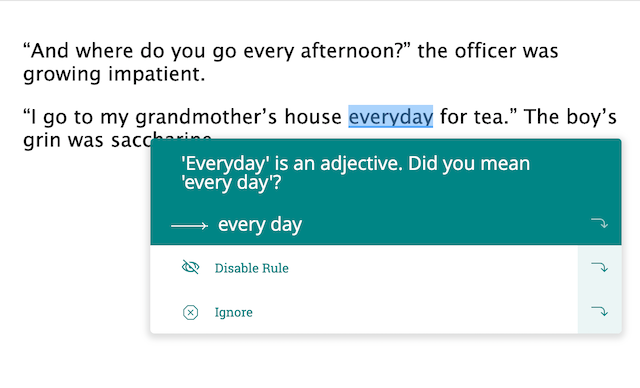
You can correct this and hundreds of other everyday writing errors (see what I did there?) with ProWritingAid.
Can You Start a Sentence with “Every Day” or “Everyday”?
Sure, so long as the sentence still follows the rules we’ve laid out here. A few examples of “everyday”:
- Everyday players get fatigued faster than professional players.
- Everyday events like this never make the news.
- Everyday heroes like you deserve more attention!
The same goes for “every day.” Some more examples:
- Every day I have the blues.
- Every day is a gift.
- Every day that dog barks at me!
You might even try throwing both in one sentence, just to be tricky.
- Everyday concerns like these shouldn’t haunt me every day.
- Every day you tell me about these everyday issues. When are you going to find help?
- Everyday fruits and vegetables, like bananas and carrots, should be eaten every day.
When to Use Everyday and Every Day: Common Examples
Looking for a specific example of when to use every day and everyday? We’ve got you covered. Find the answers to some of the most common questions below.
Is There Any Difference Between “Daily” and “Everyday”?
Glad you asked. Yes!
Some may think “daily” and “everyday” are synonyms, but they aren’t quite the same in every instance.
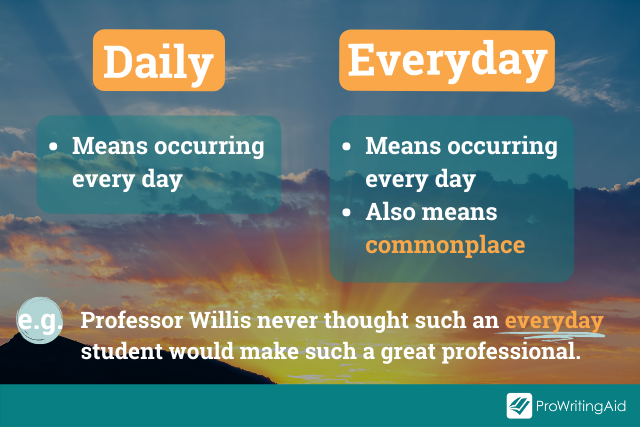
“Daily” pretty much means the same thing every time: occurring every day. “Everyday” might mean the same (“everyday delivery,” for instance), but it also means “commonplace.” Take this sentence, for example:
“Professor Willis never thought such an everyday student would make such a great professional.”
For many, such differences might seem unimportant. But for writers like you and I, who need the exact right word for every instance, it’s important to learn these distinctions. Consider the context of the sentence you’re writing, then use the word that most accurately fits your description.
What Is the Difference Between “Every Day” and “Day by Day”?
This is another subtle difference, but one that should prove important. “Every day” of course means each day throughout a duration. “Day by day” is a more archaic phrase, and therefore one you won’t hear quite as often. It refers more to a tedious passage of time. Here are some examples:
- Day by day, Ronald’s condition worsens. I fear we may have to close McDonald’s.
- Things are bad now, but they’ll get better, day by day.
- Freshman year was tough, but day by day, Wally soldiered on.
As you can see, substituting the phrase “every day” in any of these sentences loses the effect of a long time elapsing. If you want that eternity-passing-slowly sort of feeling, opt for “day by day.”
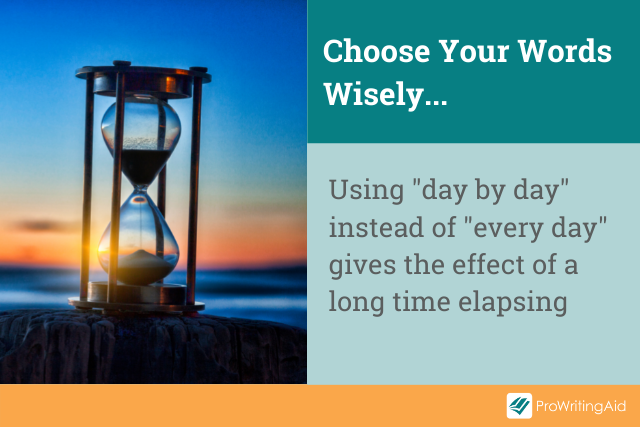
Why Is “Everyday” a Single Word and Not “Every Week” and “Every Year”?
This is a question many writers ask, and it’s a good one. I’ve never seen the words “everyweek” or “everyyear,” have you? I’m guessing not, because my spellchecker is furious at me right now.
The reason is, of course, that “every week” and “every year” are analogous to “every day,” not “everyday.” These too are verbal phrases, so they modify verbs. Since “everyday” is an adjective, it modifies nouns. Consider these sentences:
- Ellie goes to the doctor every year, though she doesn’t enjoy it.
- Leslie plays poker every week. (She’s one of the dogs in the famous picture.)
- I practice singing Bruce Springsteen’s “Santa Claus is Coming to Town” every week so I can sing it really well at my Christmas party every year.
(That last example may or may not be autobiographical.)
There’s rarely any need to combine these adverbial phrases into one word. However, if you really want to turn “every week” or “every year” into an adjective, make sure you use a hyphen.
- These every-week tests are killing me.
- Hey, we should turn this into an every-year vacation destination.
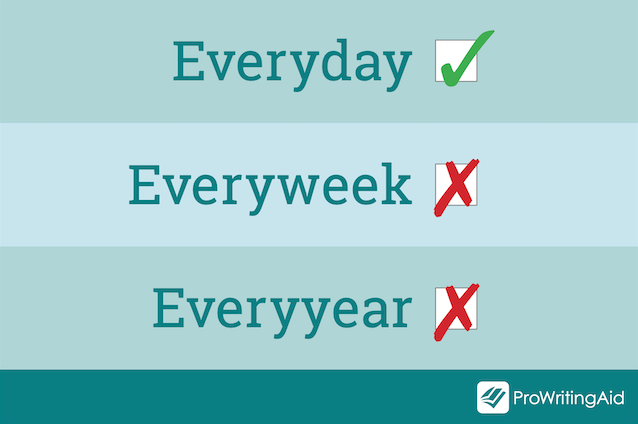
Why Is “Everyday/Every Day” One or Two Words But “Every Night” is Always Two?
As noted, “everyday” is a word that confuses many people because it’s so similar to an existing verbal phrase. Therefore, many people expect it to have analogous meaning. The answer is very similar to the previous question.
“Every night” makes sense as a phrase because it basically means each night. For example…
“Every night I turn into a werewolf. Please don’t tell my mom.”
If we combined this verbal phrase into a single adjective, it would need some new meaning that we don’t yet have. After all, “everyday” means commonplace, so what would “everynight” mean? I suppose you could use the hyphen again…
“My werewolf transformation is an every-night affair.”
But that usually comes out a little awkward. “Every night” is almost always best.
Would You Say, “I Miss You Every Day” or “I Miss You Everyday”?
Let’s restructure this sentence for help in determining what word is being modified.
“[Everyday/every day] I miss you.”
Which word is being modified: “miss” or “you”? It’s the former, since the meaning of the sentence is essentially “each day I miss you.” It’s clearly not the latter, since we’re not implying the “you” in this sentence is commonplace.
So, the correct constructions are:
- “Every day I miss you.”
- “I miss you every day.”
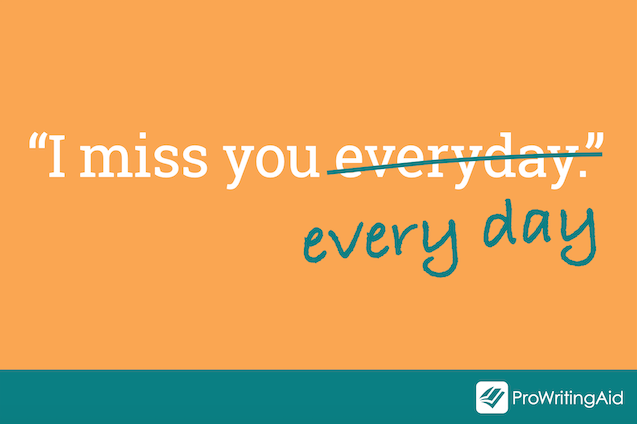
What Does “All Day, Every Day” Mean?
This is a common idiom that’s kind of redundant, yet admittedly fun to say. It’s usually used to underscore the consistency of a person’s work ethic, like in the following examples:
- All day, every day, Steph Curry plays his heart out.
- Listen, kid. You just gotta put your head down and work hard, all day, every day.
- Question: “Will you be here tomorrow?” Answer: “All day, every day.”
Just make sure to avoid writing “all day, everyday,” because as you probably know, that’s incorrect. That phrase would suggest the day is mundane all the time—or something. It clearly doesn’t make much sense, so don’t do it!
What Is the Difference Between “Every Day” and “Every Single Day”?
Honestly, the latter phrase is a little superfluous. “Single” isn’t really necessary, since it’s an extra word that doesn’t add much meaning to the phrase. However, “every single day” is used colloquially, especially when people are trying to make a point. Try keeping it in dialogue, like in the following examples:
- “Every single day you ask me that question. When is it going to end!?”
- “Do you still think about that moment? Because I do. Every. Single. Day.”
- “Look, I’m sure Bob is fine. It’s not like he gets abducted by aliens every single day, right? It just happens a few times a year.”
What Is the Difference Between “Everyday”/“Every Day” and “Anybody”/“Any Body”?
“Anybody” is a pronoun that simply means “anyone,” whereas “any body” are two distinct words. Unlike “every day,” “any body” is not an adverbial phrase.
If you’re unsure of whether to use “anybody” or “any body,” try substituting the word “anyone.” If the sentence still makes sense, “anybody” is correct. If it doesn’t, “any body” might be correct. For instance:
“Did [anybody/any body] hear what I just said?”
Let’s substitute with the synonym “anyone”:
“Did anyone hear what I just said?”
That makes perfect sense, so “anybody” is correct. And never forget: context matters. Just look at this example:
“I didn’t see [anybody/any body] at the ice cream stand. Did you?”
Using “any body” in this sentence implies someone was murdered at the ice cream stand, and then their body was hauled away. Probably not what the author meant.
In Conclusion
We hope this article helps you identify when it’s correct to use “every day” and “everyday.” For those gray areas, or if you’d just prefer to focus on writing, try ProWritingAid’s grammar reports. Not only will it help you select the correct everyday or every day—it’ll also catch potential problems like confused words, missing punctuation, and sentence fragments.
Now get out there and write, writer!


